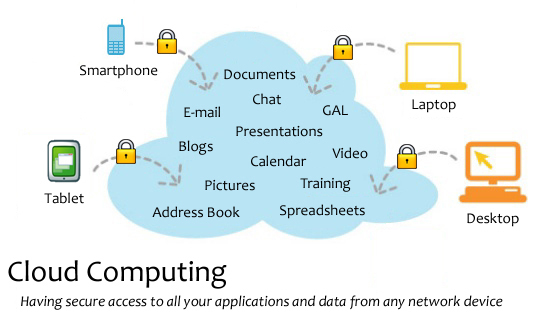Depending on your CRM system, along with related/linked systems such as email or documents, there's a huge variety of options, each with different functionality.
I've had people think that "cloud" is actually a Microsoft product - clearly this is not the case. Nor is it all inclusive - you can have some applications locally on your desktop, some hosted, and some as a service, as I'll explain below - I actually have this exact setup.
Regarding CRM systems, there are two systems I primarily support - Sage ACT! and ZoHo CRM. Additionally, I use Google products for personal and business use as well, which links to both systems.

Zoho is a SaaS company, where their entire application suite is what I'd call "in the cloud". I use the following - CRM, Invoice, Mail (linked with GMail), Project, Support, Docs, Creator, and Meeting. Each of these applications are hosted by Zoho, and I can access them via a browser, or my phone, from anywhere. There is nothing installed on any of my computers or phone, and data updated once is visible anywhere immediately.

Google is the same way - I use GMail, Calendar, and Docs - all online with no local/desktop linkage.

ACT! is the other CRM system I use, and this one is a combination of mobile and desktop. I have the desktop version of ACT installed, which I open on one specific computer. However, I also have the web version installed, which allows me to access my ACT! database from any browser. Now, I also have one other product linked to ACT! that adds the "cloud" component to ACT!. I use HandHeld Contact, which is a small app installed on the same machine as my ACT! database, but it's also service that syncs my ACT! database to my phone via their sync service. This is actually done via an iPhone app, so I can get my ACT! data whether or not I'm connected to the internet.
Really, what it comes down to is 1) which system provides you with the functionality you need for your business, and 2) how much mobile access is important to you. Don't jump on one bandwagon just because of what's "hot" now, make sure your business, and the people using the system, will be able to benefit from it.
CRM systems should make your work more efficient. Please contact me with any questions or comments. I can help you with optimizing your CRM system, or, if needed, converting to an updated platform. I convert old and new ACT! databases, Goldmine, Outlook, Excel, and more.
Richard Brust | CRM Consultant

What happens to my data if my cloud CRM goes out of business?
ReplyDeleteGood question - this also relates to a question I get regarding who "owns" the data. In a perfect world, they would give you plenty of notice, and a [simple] method to get your data out in a usable format so that you could import it into another CRM system. Not sure what would happen in the real world, as I've not seen this happen yet, at least in regards to a company going out of business.
ReplyDeleteI have had a few conversions *from* a cloud system back to ACT!, and their export methods are not as good as what ACT! allows, since your ACT! data is in SQL Server, which is a)popular and b)installed on a system you either own or have total control over.
This is one of the reasons I really still like and recommend ACT - it has the best of both worlds. You can have a locally installed (desktop) version if you'd like, or you can use it over the web. Additionally, there are currently a handful of methods available to get your data on a smartphone or other mobile device. With ACT!, you keep total control of your data, and choose when, where, and how to access it.